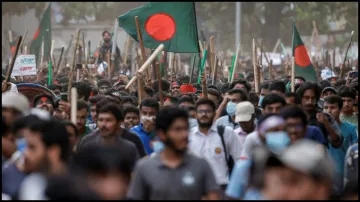India issues advisory for citizens in Bangladesh, urges them to avoid travel amid anti-quota protests
Student protesters demanding reforms in the quota system for government jobs announced a complete nationwide shutdown on Thursday. At least six people were killed in violent clashes as police fired tear gas and rubber bullets to quell the unrest.

Dhaka: India has issued an advisory for Indian community members and students residing in Bangladesh and urged them to avoid travel and minimise movement in the wake of massive protests and violent clashes over the quota system for government jobs that left at least six people dead. Notably, Bangladesh Prime Minister Sheikh Hasina has ordered an investigation.
"In view of the ongoing situation in Bangladesh, the Indian community members and the Indian students residing in Bangladesh are advised to avoid travel and minimize their movement outside their living premises," said the Indian High Commission in Bangladesh. The embassy also provided 24-Hour emergency contact numbers of Indian missions in case of any urgent assistance.
Meanwhile, student protesters demanding reform in the quota system for government jobs have called for a complete nationwide shutdown on Thursday, after deadly clashes earlier this week killed at least six people and injured hundreds. Asif Mahmud, a key coordinator of the movement, said all establishments, barring hospitals and emergency services, will remain closed, and only ambulance services will be permitted to operate.
In an address to the nation on Wednesday, Hasina said she "deeply regretted" the casualties in the violence over student protests and said that a judicial inquiry committee will be formed. She also called on demonstrators to keep faith in the country’s Supreme Court as the issue is pending there. "I believe our students will get justice (in the apex court). They will not be disappointed," she said.
Why are people protesting against quota system?
The protesters are angry over public sector job quotas, including a 30 per cent quota for family members of freedom fighters from the 1971 War of Independence, amid high youth unemployment. In Bangladesh, 56 per cent of government jobs are reserved for various quotas. Ten per cent are reserved for women, 10 per cent for people from underdeveloped districts, 5 per cent for indigenous communities and 1 per cent for people with disabilities. There are only 44 per cent of all openings available.
The quota for freedom fighters has been particularly controversial as many consider it beneficial for those loyal to Hasina's Awami League party that spearheaded the Bangladesh Liberation War in 1971. Nearly 32 million young Bangladeshis are unemployed or without education out of a total population of 170 million people.
Protests began earlier this month when the High Court ordered the government to reinstate the 30 per cent job quota. The Supreme Court suspended the order last week for a month but protests continued. To make matters worse, Hasina refused meet the students' demands and used the term 'razakar' (volunteers) - a term used for those who allegedly collaborated with the Pakistani army during the 1971 war that perpetrated some of the worst atrocities during the war.
Thousands of anti-quota protesters clashed with members of the student wing of the ruling Awami League party across the country. Six people, including at least four students, were killed during clashes on Tuesday, police said. A second-year student of northwestern Rangpur University was the first casualty on Tuesday when he was shot dead by police during a protest on the university campus.
US weighs in on Bangladesh violence
Meanwhile, the United States condemned the violence and called on Bangladesh to uphold the right to peaceful protest amid demonstrations, while saying it was watching the matter closely. "We condemn any violence against peaceful protesters. We've been watching this matter very closely, both from our embassy and officials here in Washington. (We) have been monitoring the protests, have seen the reports of people dying, being killed in the protests. And we again, call on the government to uphold individual's rights to protest peacefully," said US State Department spokesperson Matthew Miller on Wednesday.
UN Human Rights chief Volker Turk on Wednesday urged Bangladesh authorities to engage with protesting students adding “all acts of violence and use of force, especially resulting in loss of life, must be investigated and perpetrators held to account". He said freedom of expression and peaceful assembly are fundamental human rights.
The protests are the first significant challenge to Hasina's government since she secured a fourth consecutive term in January in an election boycotted by the opposition Bangladesh Nationalist Party (BNP). Experts attribute the unrest to stagnant job growth in the private sector, making government jobs, which offer regular wage hikes and other privileges.
ALSO READ | Bangladesh PM Hasina promises justice after deaths of anti-quota protesters, nationwide shutdown announced